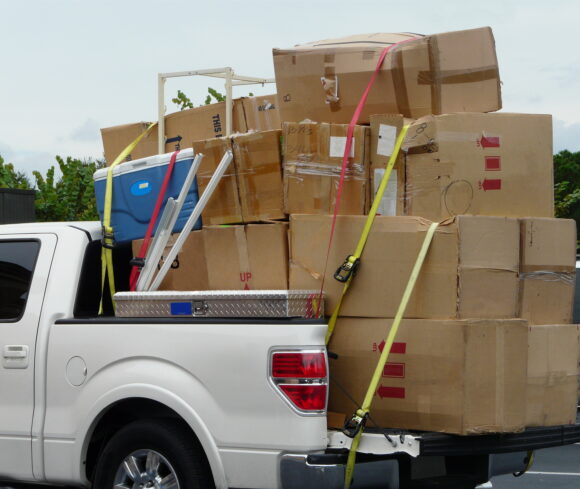Georgia shoppers who are unable to load bulky purchases onto their vehicles by themselves might find store employees less willing to help — or at least a lot more vigilant if they do lend a hand.
The Georgia Supreme Court ruled Tuesday that anyone who assists in loading something onto a vehicle has a duty to ensure the load is securely fastened. The high court rejected an argument by retailer Sam’s Club that only the operator of a vehicle should be held liable for damage caused by unsecured loads.
The US District Court in Albany, Ga. asked for the Supreme Court’s guidance as it considers a lawsuit filed against Sam’s East Inc. by a woman who was seriously injured when her vehicle struck a mattress that had become dislodged from a pickup. Amanda K. McEntyre argues that two Sam’s Club employees failed to properly tie the mattress down.
Sam’s and a business group, Georgians for Lawsuit Reform, had argued that the statute that requires loads to be securely fastened — OGCA Section 40-6-248.1 (b) (1) — should apply only to motor vehicle operators. Otherwise, helpful neighbors or store employees who assist in loading vehicles as a courtesy would be considered criminals if something happened along the way, the reform group warned in an amicus brief.
But the Supreme Court’s ruling wasn’t a total loss for Sam’s. The high court also ruled that the statute does not create “strict liability” — that is, a person who violates the law doesn’t automatically become liable for any damages caused by an unsecured load. Plaintiffs must show that the violator’s negligence was a proximate cause of the harm.
McEntyre sued McCall after the February 2016 accident and accepted a settlement. She also sued Sam’s East, alleging the store was negligent because two of its employees tied the mattresses and box springs down to McCall’s truck.
The civil complaint says McEntyre had to undergo surgeries after her shoulder and neck were injured in the collision with the loose mattress. She lost $5,542.49 in wages and had medical bills totaling $119,151.15.
After Sam’s filed a motion to dismiss the complaint, District Court Judge Leslie Abrams Gardner sent certified questions asking the Georgia Supreme Court to resolve these unsettled questions of law:
- Does Section 40-6-248.1 require a person assisting a motor vehicle operator too load merchandise on a vehicle to securely fasten the load?
- Under the statute, can a person who assisted in loading but did not operate the vehicle be held liable to a third party who was injured as a result of the manner in which the load was secured?
- Does the statute impose strict liability on a person who did not securely fasten a load that caused damage to another?
Yes, yes and no was the Supreme Court’s response.
The high court’s unanimous opinion says the plain language of the statute imposes a duty on anyone who loads items on a vehicle a duty to “other users of the public road.” Nothing in the statute limits that duty to motor vehicle operators.
Furthermore, any person who violates the statute can be held liable for any damages that result, the court said.
However, that doesn’t mean strict liability applies to violations of 40-6-248.1. The Supreme Court said strict liability typically is imposed only when the circumstances involve abnormally dangerous activities, such as using explosives. Nothing in the statute required loads to be secured on motor vehicles provides for strict liability in the context of a civil tort action, the court said.
“When a person is allegedly injured by such a load or covering falling on a public road, ordinary principles of negligence apply, meaning that the plaintiff must establish a breach of this statutory duty, proximate causation, and damages in order to establish liability,” the opinion says.
The court said its finding that there is no strict liability may “mitigate” the tort reform group’s concerns about the practical consequences of its ruling.
“A trial court cannot presume that in every instance where a load has become loose, detached, or in any manner a hazard to other users of the public road that the load was not securely fastened and that any person who assisted in loading or securing the load is liable,” the opinion says.
The case now returns to the District Court in Albany to decide the merits of McEntyre’s lawsuit. Sam’s has also filed a lawsuit against McCall seeking reimbursement for any damages that it may be required to pay as a result of McEntyre’s action.
Was this article valuable?
Here are more articles you may enjoy.


 Moody’s: LA Wildfires, US Catastrophes Drove Bulk of Global Insured Losses in 2025
Moody’s: LA Wildfires, US Catastrophes Drove Bulk of Global Insured Losses in 2025  Asbestos Lawsuits Prompt Vanderbilt Minerals to File Bankruptcy
Asbestos Lawsuits Prompt Vanderbilt Minerals to File Bankruptcy  AI Claim Assistant Now Taking Auto Damage Claims Calls at Travelers
AI Claim Assistant Now Taking Auto Damage Claims Calls at Travelers  Walmart to Pay $100 Million to Settle FTC Case on Driver Wages
Walmart to Pay $100 Million to Settle FTC Case on Driver Wages 